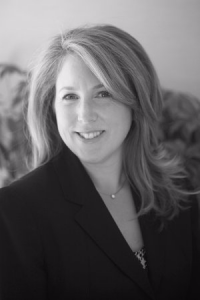The Spotlight on Flex showcases professionals from member organizations who exemplify personal and professional success while working a flexible schedule. Their stories illustrate the long-term benefits that flexible schedules offer to both individuals and organizations.
This month, we are pleased to share insights from Wendy Sugg, Counsel, Troutman Sanders (Orange County, CA).
 Diversity & Flexibility Alliance: How have you made flexibility a priority and a success through your schedule?
Diversity & Flexibility Alliance: How have you made flexibility a priority and a success through your schedule?
Wendy Sugg: I started working for a firm in New York, followed by a two-year clerkship for the Southern District of NY. There wasn’t a lot of flexibility in my schedule while in New York, but it was great training. I always knew I would come back to California – the idea of having to rent a car to get out of town was insane to me! I moved back here in 2003 and was a litigator at my first California firm for eight years. While there, I started doing a lot of employment litigation, and as I became more senior, I started thinking about specializing. It was a natural fit to stick with employment matters. I started looking for a full-service firm where I could continue to specialize, build a book of business, and have other departments to help with that too.
I found another firm that checked these boxes, and a year and a half later, I had my son. At the time, he had weekly medical appointments, and I wanted one day a week off in order to accommodate his needs and focus on his care. It was a great arrangement with my previous firm, and I started to build a good network and book of business. I was formally on a 75 percent, reduced hours schedule and came into the office four days a week.
I came to Troutman Sanders three years ago; they had no employment litigators or employment practice on the West Coast. It was another great opportunity to build my expertise and practice here. I was clear during the interview process that I wanted to continue working at a reduced hours schedule (now at 80 percent) because my son had just turned two, and we were still taking care of his medical needs. I felt comfortable asking for flexibility right from the start because it was what I needed. The firm had no issues with this, matched my salary, and brought me on as a direct lateral hire. In other words, instead of focusing on my schedule, we focused on developing a business and marketing plan. There wasn’t an employment attorney on board yet, and the firm had immediate business needs such as counseling clients and their employees during transition periods (such as post-merger or acquisitions).
